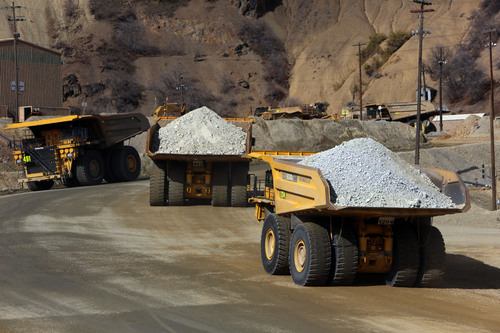This is an archived article that was published on sltrib.com in 2014, and information in the article may be outdated. It is provided only for personal research purposes and may not be reprinted.
Utah's 29 counties are charged with assessing property values and setting tax rates for land in their boundaries, but what happens when the land stretches across multiple counties?
The state has addressed this by assessing those properties for the counties, meaning the counties have had no role in assessing land values on the railroads, utilities and mines that may be their biggest sources of property tax money.
County officials say the state too often undervalues the big companies' land, and there is research to back that up. So the counties have been appealing those state assessments, and that has the big companies fighting their tax battles once at the state level and again at the county level.
So now those big companies are looking to state legislators to cut the counties out of the appeals process. That is the wrong solution, and legislators will have to show courage to choose good government over greased palms.
Make no mistake: these companies are giving tens of thousands of dollars to legislators and their campaign committees and PACS (in both parties). Legislators are not automatically guilty of corruption for taking money from the people they regulate, but they are automatically under suspicion. If they want to avoid that suspicion, they can refuse the money, which they almost never do.
For the big companies, it's simple math. A few thousand thrown at state legislators can return millions if they can fight off even a single tax increase. To the extent that the political process is influenced by cash (and does anyone want to argue it isn't?), these big companies are the biggest influencers on Capitol Hill.
Rep. Dan McCay, R-Riverton, the House chairman of the Revenue and Taxation Interim Committee, has already made clear he's on the companies' side: "I don't necessarily view this as the counties' money; I look at this as the taxpayer's dollar."
Actually, the counties' money is the taxpayers' money, and as a public servant Rep. McCay knows that. Whether values are set by state or county assessors, the taxes ultimately flow to county treasuries to pay for the infrastructure everyone needs, including the big companies.
The Questars and Union Pacifics are good for Utah. They provide essential services and are big economic drivers. They deserve a tax process that doesn't force them fight once with the state and again with the counties.
But the answer is not to cut the counties out. The counties know their values better than the state, and a recent examination by Doug Macdonald, former chief economist for the State Tax Commission, shows that taxes from the big companies have not kept pace with those from county-assessed properties. That means the tax load has been shifting to small companies and the rest of us.
This process needs to be reformed to bring the counties in earlier, and state legislators are the ones to do it. But those legislators must listen to all their constituents and not favor the ones who write the biggest checks, because too often that's how this goes.



